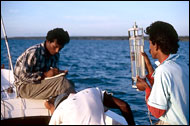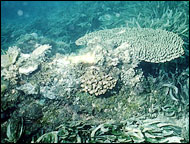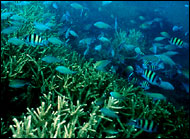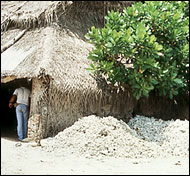Activities |
 |
The CORDIO project for the period 2004-07 consist of activities under the following six thematic areas:
A. |
Monitoring the biological, physical and socio-economic monitoring of the status of the shallow coastal reefs. |
B. |
Applied research in priority areas, for example vulnerability of corals to bleaching, coral reef restoration and rehabilitation, coral and reef fish larvae distribution and settlement, socio-economic dependence issues and food security. |
C. |
Management and policy responses to improve the reporting and interpretation of research and monitoring data, development of management-focused databases (including GIS), investigating the implications of coral bleaching on MPA sustainability and design, developing and certifying sustainable fisheries, participating actively in management and policy forums, and engaging further in national, regional and global policy issues relevant to coral reefs and related coastal ecosystems. |
D. |
New options for sustaining peoples’ livelihoods in order to diversify peoples’ sources of income in areas where dependency on reefs was high. Such activities need to be developed or transferred to the local setting through research trials. Projects such as the development of household-level mariculture, educating businesses (e.g. Divers) on alternative underwater attractions, participatory monitoring and research activities (e.g. of reefs) may be relevant, and require support for local research-oriented development and implementation. |
E. |
Education and awareness: Monitoring and research activities produce information that needs to be disseminated to the general public and different target groups in society. Activities under this theme may be conducted as outputs from other program areas that are dedicated towards education and awareness, targeted educational programs or events, or supporting similar outputs and events from other complementary programs and organizations. |
F. |
Networking and communication among scientists and managers: Projects will continue to build and strengthen the network of scientists, managers, policy makers and governments in the western and central Indian Ocean region by increasingly focusing on regional networking and collaboration among locally funded nodes and partners, providing a regional framework for sharing information and lessons learned from individual projects and sites, and strengthening its capacity to act as a conduit within the region and between the region and the rest of the world. |
The activities of CORDIO have a direct link to issues such as food security, alternative livelihoods and poverty reduction. Furthermore information generated through these activities feeds directly into two areas of global concern at present: the issues of climate change and biodiversity.
Monitoring
 (A) monitoring of the biological and physical status and socio-economic aspects of coral reefs are central components of the CORDIO program for 2004-2007. Such monitoring provides data necessary for the assessment of the long-term trends that can be related to climate change and/or to impacts from local factors. The data from monitoring is also necessary for management and policy and as background information when other research projects on the impacts of human activities in coastal areas, recovery and rehabilitation etc. are planned and implemented. The monitoring will cover both bio-physical and socio-economic aspects and factors. With Global Climate Change being increasingly recognized as the most significant driver of environmental change in coral reef environments, regional temperature monitoring will also be undertaken. Recognizing the necessity for improved management of coral reefs and the need to develop alternative use of reefs and in many cases even alternative livelihoods, capacity building for local area monitoring will be another priority. Through the promotion of collaborative monitoring and management initiatives particularly around fishing and tourism resource use areas (eg. Marine Protected Areas), improvements of the living conditions may be achieved.
(A) monitoring of the biological and physical status and socio-economic aspects of coral reefs are central components of the CORDIO program for 2004-2007. Such monitoring provides data necessary for the assessment of the long-term trends that can be related to climate change and/or to impacts from local factors. The data from monitoring is also necessary for management and policy and as background information when other research projects on the impacts of human activities in coastal areas, recovery and rehabilitation etc. are planned and implemented. The monitoring will cover both bio-physical and socio-economic aspects and factors. With Global Climate Change being increasingly recognized as the most significant driver of environmental change in coral reef environments, regional temperature monitoring will also be undertaken. Recognizing the necessity for improved management of coral reefs and the need to develop alternative use of reefs and in many cases even alternative livelihoods, capacity building for local area monitoring will be another priority. Through the promotion of collaborative monitoring and management initiatives particularly around fishing and tourism resource use areas (eg. Marine Protected Areas), improvements of the living conditions may be achieved.
Applied research
As a research and monitoring network, CORDIO will continue to support and promote (B) applied research in priority areas identified in the thematic foci, for example in areas such as bleaching vulnerability of corals, coral reef restoration and rehabilitation, alternative livelihoods, socio-economic dependence issues, food security and others. Applied research projects will be allied with aspects of local, national and regional monitoring programmes, such that the research finds serve to improve interpretation of monitoring results, and to improve the monitoring systems over the long term.
 CORDIO’s first two phases contributed significantly to highlighting challenges faced from local to regional levels due to coral bleaching, climate change impacts and their interaction with local threats. In its next phase CORDIO will attempt to develop a suit of activities aimed at illustrating alternative uses of coral reefs and their resources, in cases where reefs have been seriously overused and degraded and where reef-dependence is high.
CORDIO’s first two phases contributed significantly to highlighting challenges faced from local to regional levels due to coral bleaching, climate change impacts and their interaction with local threats. In its next phase CORDIO will attempt to develop a suit of activities aimed at illustrating alternative uses of coral reefs and their resources, in cases where reefs have been seriously overused and degraded and where reef-dependence is high.
Management and policy responses
Also in the area of problem solving and solutions, the Third Phase will devote great attention to (C) management and policy responses to the threats from degradation of coral reefs. This will be achieved by improving the reporting and interpretation of research and monitoring data, development of management-focused databases(including GIS) for use in day to day management, investigating the implications of coral bleaching on MPA sustainability and design, developing and certifying sustainable fisheries, participating actively in management and policy forums, and engaging further in national, regional and global policy issues relevant to coral reefs. Activities in this section will partially be through adding levels to activities under other program areas, and partly through dedicated activities and participation.
New options for sustaining peoples’ livelihoods
 Monitoring and research to date has highlighted the vulnerability of people dependent on coral reef resources, whether fishermen, tourists or coastal populations, to the long term degradation of coral reefs and other productive coastal ecosystems that is likely due to climate change or as a result of other destructive human activities. The development of (D) new options for sustaining people’s livelihoods is an increasing focus of many organizations globally, and will be addressed directly in CORDIO’s third phase. In many cases, new opportunities (often termed ‘alternative livelihoods’ though they may be taken on as supplemental activities diversifying peoples’ sources of income) are not known a priori, but need to be developed or transferred to the local setting through research trials. Projects such as the development of household-level mariculture, various reef management actions (closed zones or seasons, regulations regarding gear or target species etc), educating businesses (eg. Divers) on alternative underwater attractions, participatory monitoring and research activities (eg. of reefs) may be relevant, and require support for local research-oriented development and implementation.
Monitoring and research to date has highlighted the vulnerability of people dependent on coral reef resources, whether fishermen, tourists or coastal populations, to the long term degradation of coral reefs and other productive coastal ecosystems that is likely due to climate change or as a result of other destructive human activities. The development of (D) new options for sustaining people’s livelihoods is an increasing focus of many organizations globally, and will be addressed directly in CORDIO’s third phase. In many cases, new opportunities (often termed ‘alternative livelihoods’ though they may be taken on as supplemental activities diversifying peoples’ sources of income) are not known a priori, but need to be developed or transferred to the local setting through research trials. Projects such as the development of household-level mariculture, various reef management actions (closed zones or seasons, regulations regarding gear or target species etc), educating businesses (eg. Divers) on alternative underwater attractions, participatory monitoring and research activities (eg. of reefs) may be relevant, and require support for local research-oriented development and implementation.
Education and awareness
 The primary threats to coral reefs, and the necessary actions to relieve pressures on them, are societal in origin. Thus (E) education and awareness outputs are necessary responsibilities of monitoring and research activities, and to achieve management and policy goals. Activities under this program area may be conducted as outputs from other areasdedicated towards education and awareness, targeted educational programs or events, or supporting similar outputs and events from other complementary programs and organizations.
The primary threats to coral reefs, and the necessary actions to relieve pressures on them, are societal in origin. Thus (E) education and awareness outputs are necessary responsibilities of monitoring and research activities, and to achieve management and policy goals. Activities under this program area may be conducted as outputs from other areasdedicated towards education and awareness, targeted educational programs or events, or supporting similar outputs and events from other complementary programs and organizations.
Networking and communication
The connectivity and interdependence of coral reefs is increasingly recognized by scientists, managers, policy makers and governments. Thus CORDIO will continue to build on its (F) networking and communications role by increasingly focusing onregional networking and collaboration among locally funded nodes and partners, providing a regional framework for sharing information and lessons learned from individual projects and sites, and strengthening its capacity to act as a conduit between the WIO region and the rest of the world.
